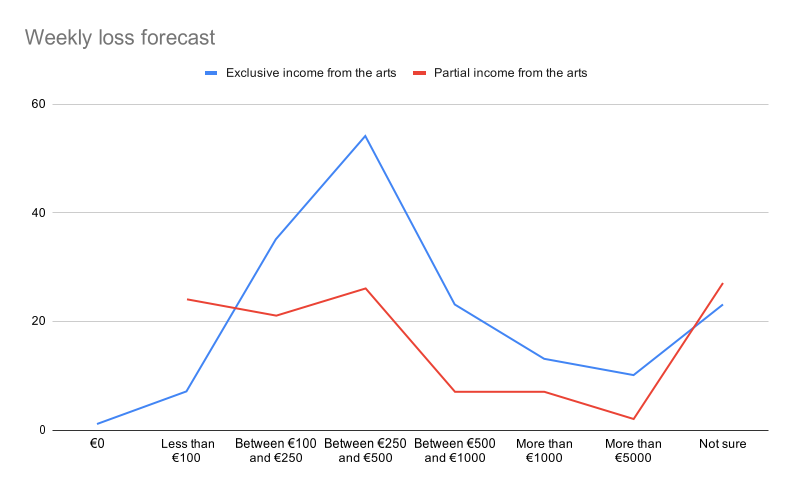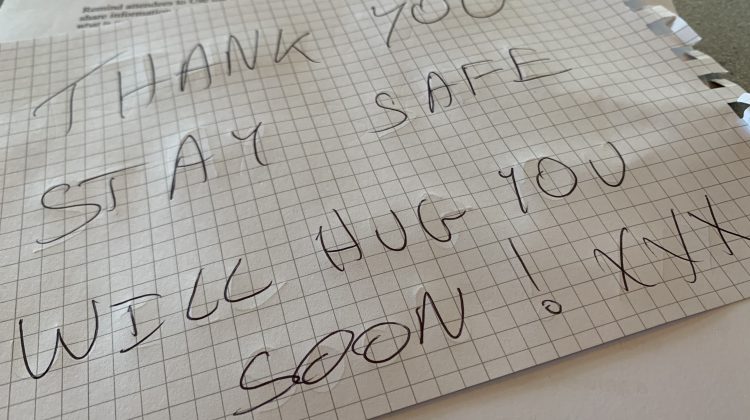
The impact of COVID-19 on artists in Malta
The emergency situation caused by COVID-19 is once again highlighting the precarious employment conditions of various artists and their right to earn a living wage. It has been reported that at least 170,000 jobs were lost in the film industry in Hollywood and the UK due to the coronavirus. Met opera has laid off all its musicians and chorus and Cirque du Soleil has laid off 95% of its staff. If it’s hitting hard for large scale cultural institutions with contracts and unions that may offer some form of protection, then how are freelance artists and small creative businesses, perhaps unrepresented or underrepresented by unions or lobby groups, reaching out for support at a time when their livelihood is at stake?
As front liners in the health sector across the world put their own lives at risk to save lives and help us get out of this safely, policymakers, culture leaders and cultural practitioners must unite to support the front liners of our soul – the artists. Artistic work is helping people to stay safe and sane at a time of global physical distancing. Whether reading a book, watching a movie, listening to music, viewing a museum online or painting your own message to your community, this is also a moment to reflect on the value of the arts, artists and their work. More than ever, this is an occasion to understand why the arts are also needed to save the world.
As soon as the emergency situation hit Malta, numerous artists shared their concerns on how the situation is going to impact them. As industry-led associations opened up conversations with Government to discuss financial measures it was evident that the absence of an equivalent industry-led organisation in Malta for the arts meant that the opportunity for a collective sector-led voice was close to none.
This experience has made me realise just what a vulnerable sector we work in and how not well represented we are.
Anecdote by an artist participating in the survey
As various governments, including the Maltese Government, start to roll-out financial measures to address the financial impact of COVID-19, such measures need to ensure protection and support for the self-employed including freelance artists. Numerous artists operate within a freelance ‘gig economy’, often moving from one gig or project to another so measuring financial losses may not always match the criteria of the new measures. It is for this reason that arts councils and cultural agencies across the globe, including Arts Council Malta, are monitoring the situation to respond as effectively as possible to the needs of the sector.
In order to support the arts in Malta measure the impact COVID-19 is having on artists, Culture Venture launched on an opt-in online survey on Sunday 14th March 2020. The survey was closed on Saturday 21st March. The survey received 346 responses of which 167 respondents earn an income exclusively from the arts and 138 partially earn and income from the arts. 41 respondents claim that they do not earn an income from the arts and therefore the total valid responses for the scope of the survey is 305. Some observations from the survey:
- 52.8% of the activities providing artists with a source of income were cancelled.
- Public artistic events, such as performances, exhibitions and concerts are the main source for lost income.
- 67.2% already suffered financial losses. 25.9% say it’s too early.
- 32.5% lost most of their income for this period, 28.2% lost all income.
- 41% claim that their family is dependent on their income from the arts.
- Generating income, future work and receiving payments are the three major concerns.
- A weekly financial loss of between €250 to €500 per artist is forecast.

95.7% of respondents believe that COVID-19 is negatively affecting their work. When asked to select the artistic sectors that most represent their work respondents were given the option to select multiple responses since various artists operate across interdisciplinary practices. The majority of respondents work in music (43%), followed by theatre (27%) and visual arts (20%). There were no significant differences in genre distribution between those whose income comes only from the arts and those earning partial income from the arts.

A total of 1,317 responses for 7 different categories for activities are captured in the survey with an average of 4.3 impacted activities per respondent. Respondents claim that more than half of the activities providing them with a source of income were cancelled. 38% were postponed, 3.9% changed and 5.2% shifted online.
Let’s not forget that shifting to online teaching and learning is not always possible, especially for practical sessions in the arts.
Anecdote by an artist participating in the survey
Earned income from public artistic events, such as performances, exhibitions and concerts registers as the most dominant response – 147 postponements, 131 cancellations, 9 changed events and 6 activities shifting online. The category of work related to artistic events also registers the highest percentage share of all postponed and cancelled events. Rehearsals, work-in-progress and creative research register the highest percentage for activities that have changed whereas arts education features as the predominant activity which shifted online.
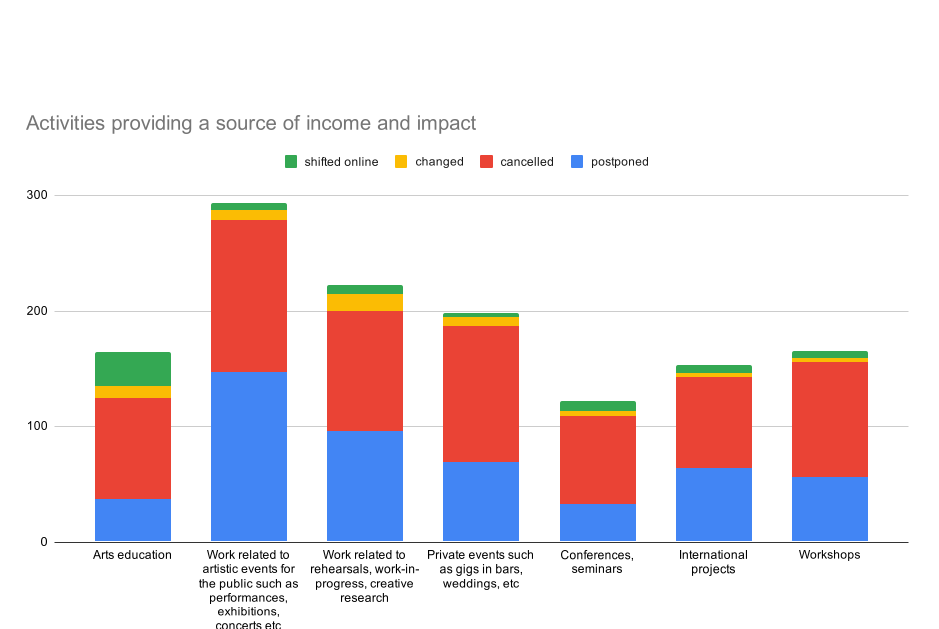
| Type of activity | postponed | cancelled | changed | shifted online |
| Arts education | 7.4% | 12.7% | 17.3% | 43.5% |
| Work related to public events | 29.3% | 18.8% | 17.3% | 8.7% |
| Work related to rehearsals etc | 19.2% | 15.0% | 26.9% | 11.6% |
| Private events such as gigs | 13.8% | 17.0% | 15.4% | 4.3% |
| Conferences, seminars | 6.6% | 10.9% | 7.7% | 13.0% |
| International projects | 12.6% | 11.4% | 7.7% | 10.1% |
| Workshops | 11.2% | 14.2% | 7.7% | 8.7% |
| 100.0% | 100.0% | 100.0% | 100.0% |
67.2% of respondents state that they have suffered financial losses whereas 25.9% believe that it is too early to say if they suffered any losses. 6.9% registered no losses by the time they responded to the survey. 32.5% of respondents state that most of their income for this period has been or will be lost and 28.2% claim that all their income for this period has been or will be lost.

18.4% of respondents claim losses of more that €1000 and 17% claim between €500 and €1000. Respondents claiming an income exclusively from the arts register higher losses that those claiming partial income. Those with partial income also claim to be the most unsure of the financial losses. Asked to forecast weekly financial losses should the current scenario be extended further, both categories of respondents claim mostly between €250 and €500 per week, followed by the €100 and €250 category for those earning an income exclusively from the arts.
During the months of lockdown, I’m not generating money, even though I might continue with preparations. Also, if a current project/s is/are postponed to e.g. October, this means that in October I cannot accept new work. So I’m losing more money.
Anecdote by an artist participating in the survey
Whereas 52.1% of respondents state that there are no dependants on their income, 41% claim that their livelihood from the arts impacts their family, 13.1% other artists, 6.2% other contractors and 5.9% employees. Respondents earning an income exclusively from the arts indicate that dependency on their income on family, other artists, contractors and employees is higher than those earning part of their income from the arts.
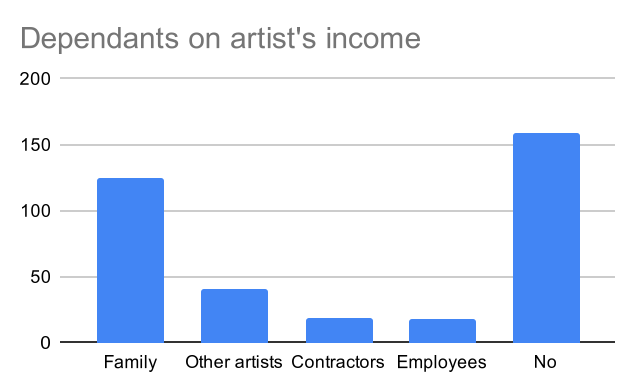
Generating income, future work and receiving payments were the three main concerns of respondents at the time of responding to the survey. Honouring contracts featured as least of concerns with 108 responses.
This is not primarily the fault of a pandemic but rather, it is the fault of bad and abusive governance with [the larger part of budgets] going to delivering content for marketing and admin, as opposed to delivering content for art. Their pay cheque doesn’t allow artists to save up for a contingency in case of such a pandemic as covid-19.
Comment by an artist participating in the survey
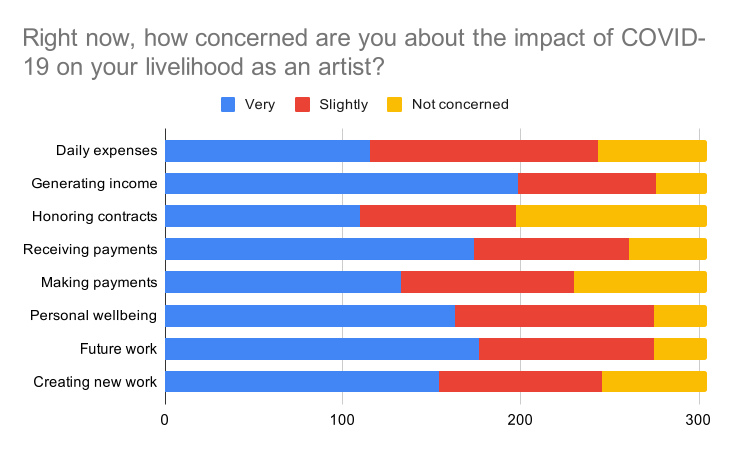
It is also important to safeguard the mental well-being of those who have been impacted severely by production cancellations and financial troubles.
Anecdote by an artist participating in the survey
This research was presented as part of a keynote delivery by Toni Attard at the International Virtual conference COVID-19 crisis & emergency funding mechanism: what action plan for the cultural and creative sectors organized by Fondation Rambourg Tunisie and Culture Funding Watch. The template of the survey is being provided as a free resource to all those wishing to capture current trends on the impact of COVID-19 on the arts.
Our colleagues at ARC research and consultancy are also conducting another survey to measure the impact of COVID-19 on the cultural and creative industries.
A global response and local action is needed to mobilize the resources of public institutions, private foundations and cultural professionals to secure immediate and effective responses.
Smile and try to carry on creating, fear will not stop the arts.
Anecdote by an artist participating in the survey
In these exceptional circumstances, Culture Venture proposes a few immediate responses, a few inspired by the conversations held yesterday and others responding to the observations that emerge from the results of the online survey. We’ll continue populating the list as we continue discussing this issue with our national and international friends.
Recommendations to Governments:
- Mobilise with immediate effect an emergency fund for artists, prioritising those earning an income exclusively from the arts.
- Consider universal basic income as a funding model.
- Ensure that current mechanisms include freelance artists as potential beneficiaries.
- Create trust funds for similar scenarios in the future .
Recommendations to public and private institutions receiving services from artists:
- Fast-track any pending payments.
- Commission new work and provide advances to pay for research and development which may be designed at home.
Recommendations to funders and sponsors:
- Do not demand back grants or sponsorship payments, especially for events where costs have already been incurred and tickets need to be refunded.
- Shift any grants that will not be issued in the interim into solidarity grants that support the livelihood of artists.
- Support wellbeing programmes for artists,
Recommendations to national and private TV and radio stations to support artists and pay for their work:
- Provide advances to scriptwriters for new drama, documentaries etc. and use this time to R&D content.
- Develop unplugged/concerts, comedy, readings in living room sessions etc – Encourage artists to record their work from home. Many have professional equipment at home.
- Kick-off new programming for children engaging actors to read stories, animators and illustrators to design graphics etc. This could all be created online. They could also be podcasts. Keep in mind that a number of voice-over artists have sound recording equipment at home so if broadcasters are worried about not achieving TV broadcast quality they can definitely get radio broadcast quality.
- Buy content of recorded shows. A number of concerts, performances and events have been recorded by professional videographers. Issue a call for content and buy content to air.
- Go crazy and have an experimental stream for TV and radio with creatives creating short programmes.
Recommendations to audiences:
- If a show has been cancelled and a refund has been offered, consider giving it back as a donation to the theatre.
- If you’re enjoying cultural content online, give a donation to the artist providing you that content or buy the content. For example, if you’re watching an online book reading, buy the book, especially it’s published by a small local publisher.
Recommendations to artists:
- Reach out to each other – other artists can be your best support network and empathy is your tool.
- Document and monetize all your losses.
- Keep track of ongoing developments on a national and international level. On the move and Circostrada network are constantly updating an online resource for artists.
- Use the time and space available to revisit, redesign or rethink your practice. Pausing is also an option.
The air is clearer – I’m painting more! Studio isolation is very inspiring… What will I do with all this work?
Anecdote by an artist participating in the survey
Recommendations to everyone:
- Stay at home
- Stay safe
- Be creative.


